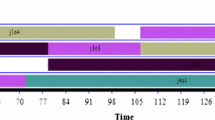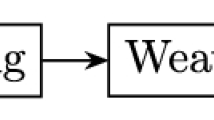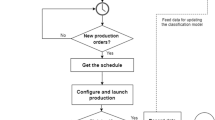Abstract
A two-machine flowshop scheduling problem is addressed to minimize setups and makespan where each job is characterized by a pair of attributes that entail setups on each machine. The setup times are sequence-dependent on both machines. It is shown that these objectives conflict, so the Pareto optimization approach is considered. The scheduling problems considering either of these objectives are \( \mathcal{N}{\wp } - {\text{hard}} \), so exact optimization techniques are impractical for large-sized problems. We propose two multi-objective metaheurisctics based on genetic algorithms (MOGA) and simulated annealing (MOSA) to find approximations of Pareto-optimal sets. The performances of these approaches are compared with lower bounds for small problems. In larger problems, performance of the proposed algorithms are compared with each other. Experimentations revealed that both algorithms perform very similar on small problems. Moreover, it was observed that MOGA outperforms MOSA in terms of the quality of solutions on larger problems.
Similar content being viewed by others
References
Agnetis A, Detti P, Meloni C, Pacciarelli D (2001) Set-up coordination between two stages of a supply chain. Ann Oper Res 107(1–4):15–32
Chou FD, Lee CE (1999) Two-machine flowshop scheduling with bicriteria problem. Comput Ind Eng 36(3):549–564
Coello CA, Van Veldhuizen DA, Lamont GB (2002) Evolutionary algorithms for solving multi-objective problems. Kluwer, Dordrecht
Collette Y, Siarry P (2004) Multiobjective optimization: principles and case studies. Springer, Berlin Heidelberg New York
Czyzak P, Jaszkiewicz A (1998) Pareto simulated annealing-a metaheuristic technique for multiple-objective combinatorial optimization. J Multi-Criteria Decis Anal 7:34–47
Deb K (2001) Multi-objective optimization using evolutionary algorithms. Wiley, Chichester
Eglese RW (1990) Simulated annealing: a tool for operational research. Eur J Oper Res EJOR 46:271–281
Gajpal Y, Rajendran C, Ziegler H (2006) An ant colony algorithm for scheduling in flowshops with sequence-dependent setup times of jobs. Int J Adv Manuf Technol 30(5–6):416–424
Gupta JND, Darrow WP (1986) The two-machine sequence-dependent flowshop scheduling problem. Eur J Oper Res 24(3):439–446
Hyun CJ, Kim Y, Kim YK (1998) A genetic algorithm for multiple objective sequencing problems in mixed model assembly lines. Comput Oper Res 25(7/8):675–690
Kirkpatrick S, Gelatt CD Jr, Vecchi MP (1983) Optimization by simulated annealing. Science 220(4598):671–680
Lee YH, Jung JW (2005) New heuristics for no-wait flowshop scheduling with precedence constraints and sequence-dependent setup time. In: Gervasi O, Gavrilova ML, Kumar V, Laganà A, Lee HP, Mun Y, Taniar D, Tan CJK (eds) ICCSA (4), volume 3483 of lecture notes in computer science. Springer, Berlin Heidelberg New York, pp 467–476
Lin S-W, Ying K-C (2007) Solving single-machine total weighted tardiness problems with sequence-dependent setup times by meta-heuristics. Int J Adv Manuf Technol 34(11–12):1183–1190
Logendran R, Salmasi N, Sriskandarajah C (2006) Two-machine group scheduling problems in discrete parts manufacturing with sequence-dependent setups. Comput Oper Res 33:158–180
Loukil T, Teghem J, Fortemps P (2007) A multi-objective production scheduling case study solved by simulated annealing. Eur J Oper Res 179(3):709–722
Low C, Wu T-H, Hsu C-M (2005) Mathematical modelling of multi-objective job shop scheduling with dependent setups and re-entrant operations. Int J Adv Manuf Technol 27(1–2):181–189
Mansouri SA (2005) Coordination of setups between two stages of a supply chain using multi-objective genetic algorithms. Int J Prod Res 43(15):3163–3180
Michalewicz Z (1996) Genetic algorithms + data structures = evolution programs. Artificial intelligence, 3rd edn. Springer, Berlin Heidelberg New York
Nam D, Park CH (2000) Multiobjective simulated annealing: a comparative study to evolutionary algorithms. Int J Fuzzy Syst 2(2):87–97
Pasupathy T, Rajendran C, Suresh RK (2006) A multi-objective genetic algorithm for scheduling in flow shops to minimize the makespan and total flow time of jobs. Int J Adv Manuf Technol 27(7–8):804–815
Ponnambalam SG, Jagannathan H, Kataria M, Gadicherla A (2004) A TSP-GA multi-objective algorithm for flow-shop scheduling. Int J Adv Manuf Technol 23(11–12):909–915
Prasad SD, Chetty OK, Rajendran C (2006) A genetic algorithmic approach to multi-objective scheduling in a kanban-controlled flowshop with intermediate buffer and transport constraints. Int J Adv Manuf Technol 29(5):564–576
Pugazhendhi S, Thiagarajan S, Rajendran C, Anantharaman N (2004) Generating non-permutation schedules in flowline-based manufacturing systems with sequence-dependent setup times of jobs: a heuristic approach. Int J Adv Manuf Technol 23(1–2):64–78
Salmasi N (2005) Multi-stage group scheduling problems with sequence-dependent setups. PhD Thesis, Oregon State University
Srinivas N, Deb K (1994) Multiobjective optimization using nondominated sorting in genetic algorithms. Evol Comput 2(3):221–248
Suman B, Kumar P (2006) Multiobjective simulated annealing: a comparative study to evolutionary algorithms. J Oper Res Soc 57:1143–1160
Suresh RK, Mohanasundaram KM (2006) Pareto archived simulated annealing for job shop scheduling with multiple objectives. Int J Adv Manuf Technol 29(1–2):184–196
Szidarovsky F, Gershon ME, Dukstein L (1986) Techniques for multiobjective decision making in systems management. Elsevier, New York
T’kindt V, Billaut J-C (2006) Multicriteria scheduling. Theory, models and algorithms. Springer, Berlin Heidelberg New York
T’kindt V, Monmarché N, Tercinet F, Laügt D (2002) An ant colony optimization algorithm to solve a 2-machine bicriteria flowshop scheduling problem. Eur J Oper Res 142(2):250–257
Wang X, Cheng TCE (2007) Heuristics for two-machine flowshop scheduling with setup times and an availability constraint. Comput Oper Res 34(1):152–162
Zhu X, Wilhelm WE (2006) Scheduling and lot sizing with sequence-dependent setups: a literature review. IIE Trans 38:987–1007
Author information
Authors and Affiliations
Corresponding author
Rights and permissions
About this article
Cite this article
Mansouri, S.A., Hendizadeh, S.H. & Salmasi, N. Bicriteria scheduling of a two-machine flowshop with sequence-dependent setup times. Int J Adv Manuf Technol 40, 1216–1226 (2009). https://doi.org/10.1007/s00170-008-1439-z
Received:
Accepted:
Published:
Issue Date:
DOI: https://doi.org/10.1007/s00170-008-1439-z




